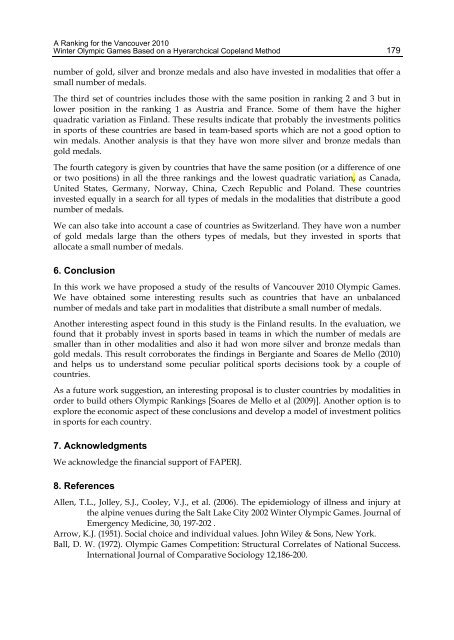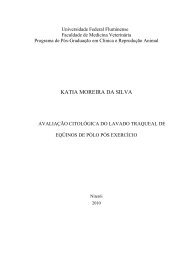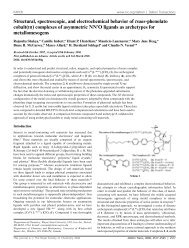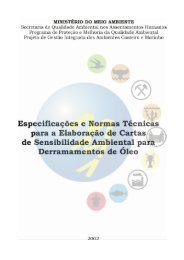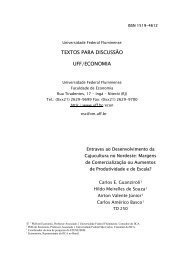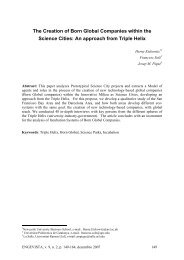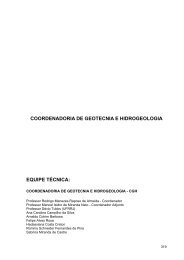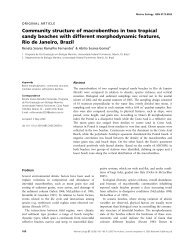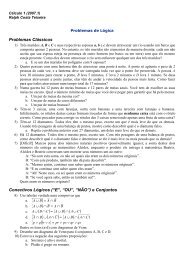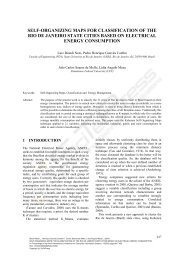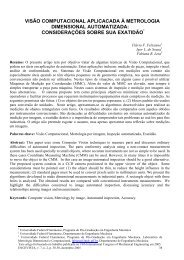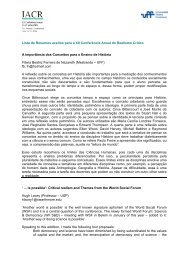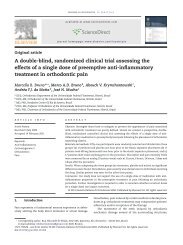A Ranking for the Vancouver 2010 Winter Olympic Games ... - UFF
A Ranking for the Vancouver 2010 Winter Olympic Games ... - UFF
A Ranking for the Vancouver 2010 Winter Olympic Games ... - UFF
Create successful ePaper yourself
Turn your PDF publications into a flip-book with our unique Google optimized e-Paper software.
A <strong>Ranking</strong> <strong>for</strong> <strong>the</strong> <strong>Vancouver</strong> <strong>2010</strong><br />
<strong>Winter</strong> <strong>Olympic</strong> <strong>Games</strong> Based on a Hyerarchcical Copeland Method 179<br />
number of gold, silver and bronze medals and also have invested in modalities that offer a<br />
small number of medals.<br />
The third set of countries includes those with <strong>the</strong> same position in ranking 2 and 3 but in<br />
lower position in <strong>the</strong> ranking 1 as Austria and France. Some of <strong>the</strong>m have <strong>the</strong> higher<br />
quadratic variation as Finland. These results indicate that probably <strong>the</strong> investments politics<br />
in sports of <strong>the</strong>se countries are based in team-based sports which are not a good option to<br />
win medals. Ano<strong>the</strong>r analysis is that <strong>the</strong>y have won more silver and bronze medals than<br />
gold medals.<br />
The fourth category is given by countries that have <strong>the</strong> same position (or a difference of one<br />
or two positions) in all <strong>the</strong> three rankings and <strong>the</strong> lowest quadratic variation, as Canada,<br />
United States, Germany, Norway, China, Czech Republic and Poland. These countries<br />
invested equally in a search <strong>for</strong> all types of medals in <strong>the</strong> modalities that distribute a good<br />
number of medals.<br />
We can also take into account a case of countries as Switzerland. They have won a number<br />
of gold medals large than <strong>the</strong> o<strong>the</strong>rs types of medals, but <strong>the</strong>y invested in sports that<br />
allocate a small number of medals.<br />
6. Conclusion<br />
In this work we have proposed a study of <strong>the</strong> results of <strong>Vancouver</strong> <strong>2010</strong> <strong>Olympic</strong> <strong>Games</strong>.<br />
We have obtained some interesting results such as countries that have an unbalanced<br />
number of medals and take part in modalities that distribute a small number of medals.<br />
Ano<strong>the</strong>r interesting aspect found in this study is <strong>the</strong> Finland results. In <strong>the</strong> evaluation, we<br />
found that it probably invest in sports based in teams in which <strong>the</strong> number of medals are<br />
smaller than in o<strong>the</strong>r modalities and also it had won more silver and bronze medals than<br />
gold medals. This result corroborates <strong>the</strong> findings in Bergiante and Soares de Mello (<strong>2010</strong>)<br />
and helps us to understand some peculiar political sports decisions took by a couple of<br />
countries.<br />
As a future work suggestion, an interesting proposal is to cluster countries by modalities in<br />
order to build o<strong>the</strong>rs <strong>Olympic</strong> <strong>Ranking</strong>s [Soares de Mello et al (2009)]. Ano<strong>the</strong>r option is to<br />
explore <strong>the</strong> economic aspect of <strong>the</strong>se conclusions and develop a model of investment politics<br />
in sports <strong>for</strong> each country.<br />
7. Acknowledgments<br />
We acknowledge <strong>the</strong> financial support of FAPERJ.<br />
8. References<br />
Allen, T.L., Jolley, S.J., Cooley, V.J., et al. (2006). The epidemiology of illness and injury at<br />
<strong>the</strong> alpine venues during <strong>the</strong> Salt Lake City 2002 <strong>Winter</strong> <strong>Olympic</strong> <strong>Games</strong>. Journal of<br />
Emergency Medicine, 30, 197-202 .<br />
Arrow, K.J. (1951). Social choice and individual values. John Wiley & Sons, New York.<br />
Ball, D. W. (1972). <strong>Olympic</strong> <strong>Games</strong> Competition: Structural Correlates of National Success.<br />
International Journal of Comparative Sociology 12,186-200.


